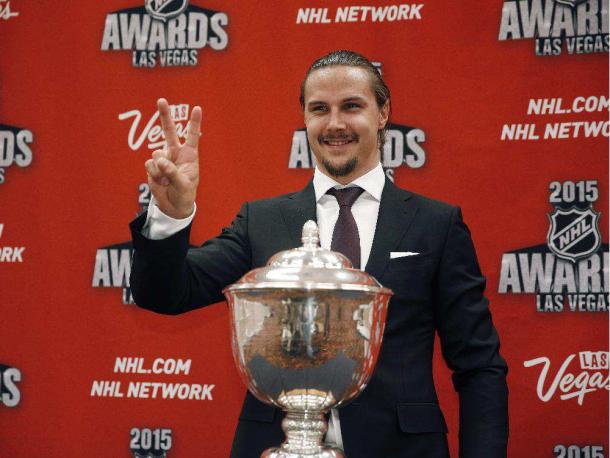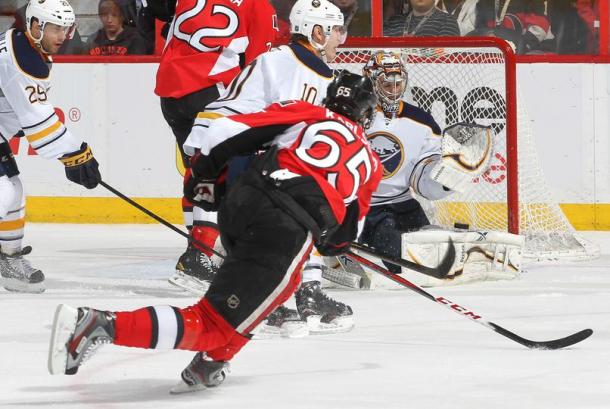On October 19, 1966, against the Detroit Red Wings, the greatest defenseman in the history of hockey made his regular season NHL debut. He won his record 8th James Norris Trophy, recognizing him as the best rear-guard in the league, in 1975. In between, he completely revolutionized what it meant to be a defenseman in hockey. Yet, more than 40 years later, many, many people associated with hockey, from fans to the media and the team management, lack an accurate understanding of the true value of offensive defenseman.
Unparrelled Success
Bobby Orr led the entire NHL in scoring twice, in the 1969–70 and 1974–75 seasons, receiving the Art Ross Trophy. He scored more than 100 points six times, with a career high of 139 points. He was one of the most dangerous offensive players in the league during his career, using his incredible speed and acceleration, along with his vision and open-ice artistry to dominate opposing players. Before Orr, defenseman hung back. They did not lead rushes and they did not carry the puck. The Boston Bruins great changed all of that forever. Without Bobby Orr, would we have players like the Montreal Canadiens’ P.K. Subban, the Chicago Blackhawks’ Duncan Keith, the Dallas Stars’ John Klingberg and most of all, the Ottawa Senators’ Erik Karlsson, this era’s greatest offensive defenseman? Likely not.
Lasting Impact
"A defenseman, as interpreted by Orr, became both a defender and an aggressor"
Sports Illustrated's E.M. Swift wrote about Orr, "He changed the sport by redefining the parameters of his position. A defenseman, as interpreted by Orr, became both a defender and an aggressor, both a protector and a producer. Orr was more than an opportunist: He created opportunities." It is thanks to number four that coaches realized that defense was more than a place to put players who could not skate, that it was worth the mistakes to allow defensemen with real offensive talent the freedom to use it. Brian Leetch, a Hockey Hall of Fame defensemen, credits Orr with creating the acceptance that convinced his coaches to play him on defense. My dad said, 'Why don't you play 'D', you get on the ice more, every other time?' My coaches weren't against it because they could see I could get up ice and still make plays. What Bobby did became accepted."
Bobby Orr changed the very nature of the game of hockey, and though players and coaches followed his example, the rest of hockey still has not caught up. Hockey is full of traditionalists, and even nearly fifty years the original offensive defenseman came into the league, that is nowhere in the traditional definition of a defenseman. Many people still see hitting, shot-blocking, penalty-killing and safe play as the hallmarks of a great defenseman. This is never clearer than when it comes to the Norris Trophy and Erik Karlsson.
Today's Superstar

Here's the thing with Erik Karlsson: he's not "good" offensively. He is the most dominant offensive D since Orr, and that's not hyperbole.
— Rhys Jessop (@Thats_Offside) December 20, 2015
Karlsson is currently the best offensive defenseman in the world. Not arguably, not probably, he just is. It is not up for discussion. When considering the scoring rates of different eras, he appears to be the best since Bobby Orr. Karlsson has led his position in scoring three out of the last four seasons. The only time he didn’t was the lockout shortened 2013 season, when Matt Cooke sliced his Achilles tendon. As of the holiday break this season; he is again leading all defenseman, but more impressively, he is tied for fifth out of all skaters with St. Louis Blues sniper Vladimir Tarasenko, behind only the Blackhawks’ Patrick Kane, the Stars' dynamic duo of Jamie Benn and Tyler Seguin, and Edmonton Oilers winger Taylor Hall. Ottawa’s captain is something special. And though he has the awards, having won the Norris Trophy twice so far (he is the current favorite to win this year’s award, as well), what he does not have it the respect he deserves.
Lack of Respect
Hockey purists take issue with the fact that he rarely kills penalties and is not an especially physically dominant player. They call him one-dimensional and bad in his own zone. They argue that he does not deserve his trophies, claiming he wins them only because his gaudy offensive numbers dazzles voters, who are too lazy to look past basic scoring statistics. This is an interesting argument, since most of those same people choose to ignore all the advanced stats that show Karlsson to be truly elite and put to rest the idea that he is a defensive liability. Those people ignore the full picture.
My dad is convinced that Erik Karlsson gives up more scoring chances than any other D. I must be adopted.
— Bonk's Mullet (@BonksMullet) December 23, 2015
He may not play on the penalty kill, but it is worth asking why he doesn’t. Ottawa fans who have watched him play for several seasons will tell you that when he does kill penalties, he is very effective, not surprising when one considers his excellent positioning and vision, not to mention his elite ability to break the puck out of his own zone. A more likely explanation for his lack of time spent shorthanded would be that he already plays the second-most minutes in the entire NHL, behind only Ryan Suter of the Minnesota Wild. Karlsson’s abilities are best used at even-strength and on the power-play, and though he is clearly one of the fittest players in the league, it would not be in his or his team’s best interest to make him play more than his current average of 28:16 per game (NHL.com) or to decrease his time with the man advantage or at five-on-five just to give him more shifts on the penalty kill.
He may not be the biggest player, but he dominates opponents with his speed and acceleration and has been known to lay out opposing players when required. He uses his speed and skill to gain passion of the puck, as opposed to his strength. It works very well for him, so why not? As for the question of him being a liability, he is the most trusted player on his team, and is always out to defend a late game lead. So what does his coach know that his critics are missing?
Offense as Defense

The Ottawa Senators clearly understand the truth behind the old saying that the best defense is a good offense. This is an idea that is often scoffed at, but follows basic logic. When your team has control of the puck in the offensive zone, the likelihood that you will be scored on is very low, even without the possibility of scoring a goal of your own. It’s not advanced or complicated; it’s simple. Defending in your own zone for any length of time is very dangerous. Spending an extended period of time there is likely to lead to one of three conclusions, as was pointed out by Dimitri Filipovic of Today’s Slapshot. These are taking a minor penalty, conceding a goal against, or simply tiring out your players and inhibiting your offense, which has no chance to produce goals. This is why puck possession has come to be considered so crucial to success. But though that has been accepted, defensemen who drive possession have not been, not completely.
Famous Fans
Unsurprisingly, Bobby Orr has long recognized that the inherent risk in Karlsson's game is more than worth it. Back in spring 2012, he spoke about the young Swede at length to the Ottawa Sun. “He’ll get caught. I got caught. The players understand how he plays. They accept it. He’s fast enough to get back a lot of times. You have kids coming along where (the coach says) shoot the puck up the glass and shoot it in," Orr said. “The coach is letting (Karlsson) do it and since they’ve allowed him to do it, this kid has been unbelievable. But, let him do it. That’s how he is most effective. Is he gonna make mistakes? Yup. Is he gonna get caught? Yup. But the pluses are going to outweigh the minuses. The best defence is to get the puck and he gets it. He moves it as well as anybody."
"The best defence is to get the puck and he gets it. He moves it as well as anybody."
Erik Karlsson is doing his best to prove that there is more than one way to be an elite defenseman, which fans and media alike would be wise to accept. Whether or not you believe it, Karlsson (and players like him) transition the puck, drive possession and create offense. They help their team to win, which is the real job of any player. Instead of hanging on to an antiquated idea of what a Norris winner should look like, everyone would be better off realising that the best defenseman is the defenseman who does the most to help his team win. After that, just sit back and enjoy. You wouldn’t want to waste the career of a truly special player by complaining about his success, would you?
Erik Karlsson is the best defenseman in the world. I know this can be tough to come to terms with if you just came out from under a rock.
— Dimitri Filipovic (@DimFilipovic) December 20, 2015
"It must have been cool to watch Erik Karlsson, right dad?" "Actually son, I always moaned about how he won awards and was bad defensively."
— Corey Sznajder (@ShutdownLine) December 17, 2015










































